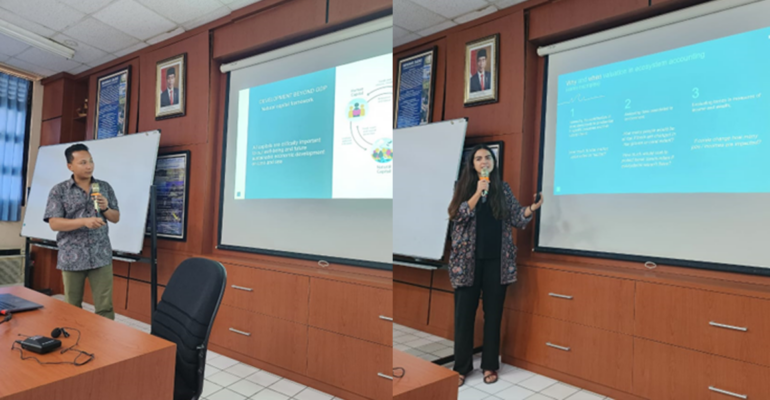Two UNSW Experts Present the Calculation of Marine Resource Balance at IPB University

The calculation of marine resource balance is currently a milestone in national development. The results of the calculation will provide information on sustainable development, provide benefits to the environment and long-term economic stability.
Responding to this challenge, the Coastal and Marine Resource Management Study Programme (SPL), Department of Aquatic Resource Management (MSP), Faculty of Fisheries and Marine Science (FPIK) IPB University held a public lecture: ‘Ecosystem Accounting for the Ocean: State, Trends and Challenges within Monetary Valuation’. Present were two speakers from the University of New South Wales (UNSW), Dr Jordan Gacutan and Maria Alarcon Blazquez.
“Resource balance should be calculated to obtain national marine development goals and targets implemented in the framework of marine spatial planning, marine protected areas and blue economy. For that, the government can determine indicators of development achievements,” said Dr Jordan when explaining the framework and concept of resource balance.
On this occasion, he also presented cases in several countries, including the current status in Indonesia, both at the national level and at the site level such as in Gili Matra, West Nusa Tenggara.
Maria, another resource person, also strengthened the explanation by elaborating on how the monetary valuation of ecosystem services. She presented several methods that can be used in calculating resource balance, one of which is the cost of quota/permit fees.
“Other methods that can be used include market price, adjusted, hedonic pricing, travel expenditure and replacement cost. These various methods certainly need to be adjusted to the objectives, data and capacity,” she added.
Discussions were also held directly between students and speakers. The forum saw that in today’s world it is very important to understand coastal and marine ecosystems. Ecosystems provide important ‘ecosystem services’ to humans, such as food provision, recreation, climate regulation, coastal protection and others that are all part of natural capital.
However, coastal and marine ecosystems are in rapid deterioration due to pollution, overfishing, climate change and habitat destruction. This can also lead to a failure to properly value natural capital, including in decision-making processes.
Measuring and managing natural resources is essential for sustainable development. It is also the basis for governments to make informed decisions about the development and management of natural capital and the impact of economic activities on the environment.
Natural Capital Accounting (NCA) provides the necessary framework for this purpose. Monetary valuation can help achieve a balance between economic development and ecological preservation. This approach enables the integration of environmental considerations into business and policy decisions, ultimately encouraging sustainable practices.
“Hopefully, students can get new learning and experience from this public lecture activity. And, in the future they can build networks with the two speakers from UNSW who attended,” said the Chairman of the MSP Department of IPB University, Prof Hefni Effendi at the end of the activity. (*/Rz) (IAAS/RUM).
Source: IPB NEWS
Share